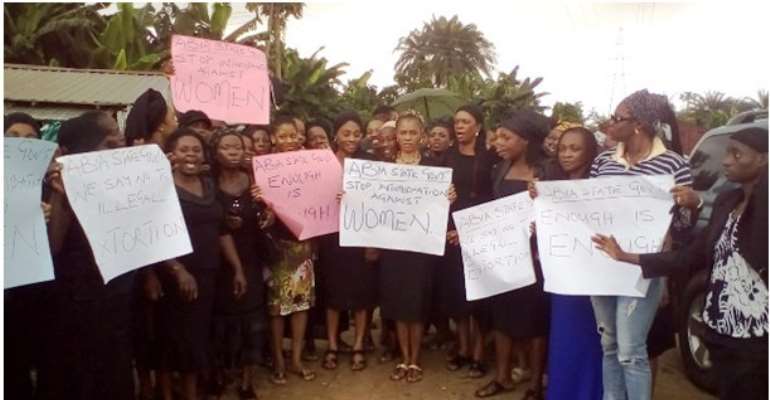Aba Market women protest alleged imposition of N3,600 tax

Aggrieved women at Ochendo Shoes and Bags Industrial Market, Aba, Abia State, yesterday, staged a peaceful demonstration to protest against imposition of high tax by officials of some government revenue agents.The over 500 women, dressed in back attire, closed their shops and stormed the Court Premises at the Osisioma Ngwa Local Government Secretariat, Aba, as early as 9a.m. with different placards. Some of the placards read in part: “Abia State Government: Stop Intimidation Against Women”, “Abia State Government: We say no to illegal extortion”, “Abia State Government: Enough is Enough”, “Abia State Government: Remember Aba Women Riot of 1929”
Speaking to newsmen during the protest, Mrs. Loveth Henry, a stakeholder in the market, said the State government took them to Court for their refusal to pay an imposed tax of N3,600, to state government revenue agents in addition to other taxation imposed by the revenue agents, such as: Infrastructure levy of N2,000, Sanitation levy of N1,000, Central levy of N1,000, Zonal levy of N500.
According to her, upon all the levies they pay to the state government, the market has no light and not easily accessible because of bad roads and that any repair to be carried out by the authority attracts an additional payment of N5,000
Another protester who gave her name as Edna, said “Aba market women are tired of paying all sorts of levies.it was because of our refusal to pay the new taxation that all sorts of intimidation were unleashed on us and they have taken us to court in order to force us to pay through court process”. The traders contended that as the matter is still pending before the Magistrate Court, the same group of revenue agents came into the market again and told them that whether they like it or not they must pay the tax.
Another protester who did not want her name in print wondered how the state government would impose tax totaling over N10,000 on a woman whose ware does not worth N15,000, as most of them are petty traders. She called on the state government to address this issue of tax imposition by state revenue agents in Aba and the use of court to perpetrate their acts. According to her the court has sat for three times and it was only on the day of the protest that the State Counsel appeared and wondered how a government would turn a deaf ear to cries of intimidation by her citizens. The case, however, was adjourned to Thursday next week.
Adding her voice, the Executive Director of African Centre For Human Advancement and Resource Support (CHARS-Africa), Amaka Biachi, condemned the excessive extortion by Abia state revenue agents and insisted that the call for more taxes and levies was analogical to the continuous milking of an almost dead cow.She also decried the decadence of the market infrastructures and reminded all and sundry that the reduction in flow of traders from neighbouring states has drastically affected trading in Aba as traders no longer visit Aba for trading concerns as before since all the roads are impassable.
Reacting to the development, Comrade Cassius Ukwuegbe, of Human Rights, Justice & Peace Foundation (HRJPF), lamented on the state government’s insensitivity to several appeals from Aba residents on the intimidation by revenue agents. He said the state government should address the issue before it turns to a riot, reminiscent of what happened in 1929, when women revolt broke out and thousands of Igbo women from the Bende District , Umuahia and other places in eastern Nigeria traveled to the town of Oloko to protest against the Warrant Chiefs whom they accused of restricting the role of women in the government. According to him, women react faster than men because they bear the brunt of the societal ills.He said the Aba Women's Riots of 1929, was a revolt organised by women to redress social, political, and economic grievances. As a result of the protest, the position of women in society was greatly improved and urged the state government to urgently address the women’s grievances.
